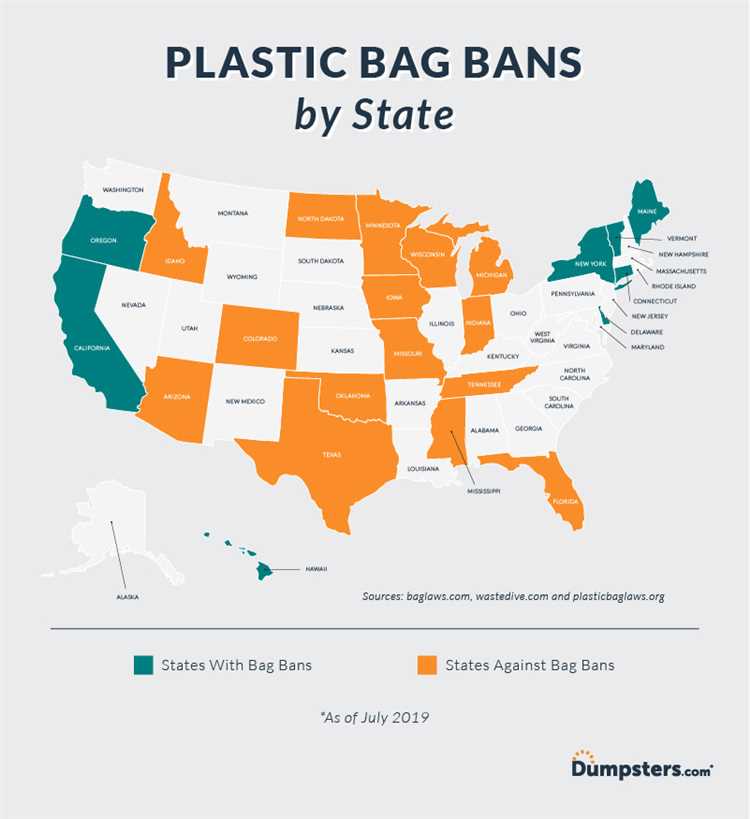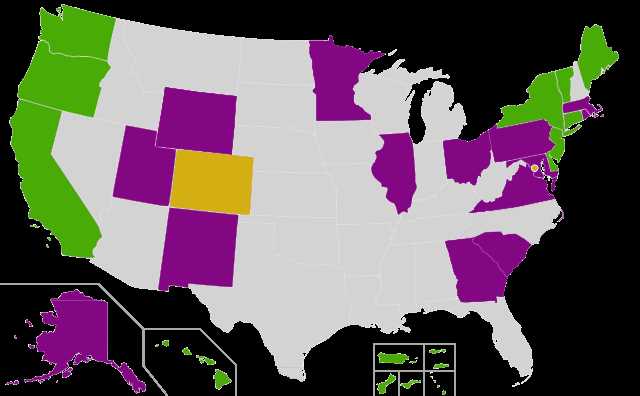The state of Oregon is taking a major step towards reducing plastic waste with its bag laws set to take effect in 2023. These laws will have a significant impact on both consumers and businesses throughout the state. It is important for everyone to be aware of the changes and how they will affect daily life.
Starting January 1, 2023, single-use plastic checkout bags will be banned in all retail establishments, including grocery stores, convenience stores, and pharmacies. This means that shoppers will need to bring their own reusable bags or purchase paper bags or durable, reusable bags from the store. The ban applies to both plastic bags provided at checkout and those used for fruits, vegetables, and bulk items.
While the ban on single-use plastic bags is a significant step towards reducing plastic waste, it is important to note that not all plastic bags will be banned. Bags used for bulk items, such as fruits and vegetables, can still be provided as long as they are reusable and made from a durable material. Additionally, plastic bags used for packaging, such as those used for meat, fish, or bakery items, will also be allowed.
The goal of these bag laws is to encourage consumers to shift towards using reusable bags and reduce plastic waste in landfills, rivers, and oceans. Oregon is leading the way in sustainability efforts, and it is important for residents and visitors to be prepared for the upcoming changes.
- Overview of Bag Laws in Oregon
- Key Features of Oregon’s Bag Laws
- Benefits of Oregon’s Bag Laws
- New Regulations Effective from 2023
- Types of Bags Affected by the Laws
- Impact of the Bag Laws on Businesses
- 1. Transition to Reusable Bags
- 2. Changes in Consumer Behavior
- 3. Increased Operating Costs
- 4. Positive Consumer Perception
- Benefits of Implementing Bag Laws
- Question-answer:
- What are the bag laws in Oregon?
- When do the bag laws in Oregon go into effect?
- Which retailers will be affected by the bag laws in Oregon?
- What bags are allowed under the new laws in Oregon?
- What are the fines for non-compliance with the bag laws in Oregon?
- What are the bag laws in Oregon?
Overview of Bag Laws in Oregon

Oregon has implemented bag laws to reduce single-use plastic waste and promote sustainability. These laws focus on limiting the use of disposable bags in retail establishments, encouraging the use of reusable alternatives.
Key Features of Oregon’s Bag Laws
1. Ban on Single-Use Plastic Bags: Retailers are prohibited from providing single-use plastic bags to customers at the point of sale. This ban applies to both grocery and retail stores.
2. Fee for Paper Bags: Retailers must charge a minimum fee of 5 cents for each paper bag provided to customers. This fee is intended to encourage the use of reusable bags and covers the cost of providing paper bags as an alternative to plastic.
3. Exemptions: Certain bags are exempt from these regulations, such as those used for bulk items, produce, meat, and prescription medications. Additionally, customers who participate in federal food assistance programs are exempt from paying the paper bag fee.
Benefits of Oregon’s Bag Laws
Oregon’s bag laws have several environmental benefits:
– Reduction in plastic waste: By banning single-use plastic bags, the laws help to reduce the amount of plastic waste that ends up in landfills and oceans.
– Promotion of reusable bags: The fee for paper bags encourages consumers to bring their own reusable bags, reducing the overall demand for both plastic and paper bags.
– Conservation of resources: By promoting the use of reusable bags, Oregon’s bag laws help conserve resources used in the production of disposable bags, such as petroleum and trees.
– Protection of wildlife: Plastic bags pose a significant threat to marine life and wildlife. By reducing the use of plastic bags, Oregon’s bag laws help protect these ecosystems and the animals that inhabit them.
In summary, Oregon’s bag laws are aimed at reducing plastic waste, promoting sustainability, and protecting the environment. By banning single-use plastic bags and implementing a fee for paper bags, the state encourages the use of reusable alternatives and helps to conserve resources for a greener future.
New Regulations Effective from 2023

Starting from 2023, Oregon will implement new bag laws in order to reduce plastic waste and promote sustainability. These regulations will impact both retailers and consumers in the state.
Under the new regulations, retailers will no longer be able to provide single-use plastic bags to customers. This includes both standard plastic bags and thicker, reusable plastic bags. Instead, retailers will be required to offer only paper bags or reusable bags made of durable materials such as cloth or canvas.
In addition to the restrictions on plastic bags, the new regulations also encourage consumers to bring their own bags when shopping. Retailers will be permitted to charge a small fee for paper bags, incentivizing customers to opt for reusable options instead.
| Retailers’ Responsibilities | Consumers’ Responsibilities |
|---|---|
| Transition to paper bags or reusable bags | Bring their own bags when shopping |
| Charge a small fee for paper bags | Opt for reusable options instead |
| Educate staff and customers on the new regulations | Dispose of used paper bags responsibly |
These regulations are aimed at reducing the environmental impact of single-use plastic bags and promoting a more sustainable lifestyle. By encouraging the use of reusable bags, Oregon hopes to significantly reduce the amount of plastic waste entering landfills and marine ecosystems.
It is important for both retailers and consumers to familiarize themselves with these new regulations and adjust their practices accordingly. By working together, Oregonians can make a positive impact on the environment and create a cleaner, greener future for generations to come.
Types of Bags Affected by the Laws

The bag laws in Oregon 2023 affect certain types of bags that are commonly used by consumers. These laws are designed to reduce single-use plastic bags and promote the use of more sustainable options. The following are the types of bags that are affected by the laws:
- Plastic Carryout Bags: The laws specifically target plastic carryout bags that are typically given out at grocery stores, convenience stores, and other retail establishments. These bags are commonly made from thin plastic and are intended for one-time use.
- Paper Bags: While paper bags are an alternative to plastic carryout bags, the laws also regulate their usage. Retailers may still offer paper bags to customers, but they must charge a fee for each bag to encourage reusable alternatives.
- Reusable Bags: The laws promote the use of reusable bags as an eco-friendly alternative to single-use bags. These bags are generally made from more durable materials like fabric or recycled materials and can be used multiple times. They are typically larger and sturdier than plastic or paper bags, and many retailers sell them to customers.
By focusing on these types of bags, the laws aim to shift consumer behavior towards more sustainable bag options while reducing the environmental impact of plastic and paper waste. It is important for consumers to be aware of these changes and to make a conscious effort to bring their own reusable bags when shopping.
Impact of the Bag Laws on Businesses
The implementation of bag laws in Oregon in 2023 will have a significant impact on businesses across the state. These laws aim to reduce plastic waste and promote sustainable practices, but they also require businesses to make adjustments to their operations and potentially face additional costs. Here are some of the key ways in which bag laws will affect businesses:
1. Transition to Reusable Bags
One of the main provisions of the bag laws is the requirement for businesses to transition from single-use plastic bags to reusable bags. This means that businesses will need to provide or sell reusable bags to their customers, which can potentially be a significant investment. However, this transition also presents an opportunity for businesses to brand and promote their eco-friendly practices through custom-designed reusable bags.
2. Changes in Consumer Behavior
With the introduction of bag laws, consumers will need to adapt their shopping habits and remember to bring their own reusable bags when going to businesses. This shift in behavior may take some time to take hold, and businesses may initially see a decrease in bag usage as consumers adjust. It will be essential for businesses to educate and remind their customers about the bag laws to ensure compliance and a smooth transition.
3. Increased Operating Costs

Businesses may face increased operating costs due to the bag laws. The cost associated with providing or selling reusable bags, training employees on the new regulations, and potentially a decrease in revenue from no longer selling single-use plastic bags can all impact the bottom line. It will be crucial for businesses to factor in these additional expenses while planning their budgets and pricing strategies.
4. Positive Consumer Perception

Despite the challenges, businesses that embrace and actively support the bag laws can benefit from a positive consumer perception. Many customers appreciate and prioritize sustainability, and businesses that align with these values can attract a loyal customer base. By showcasing their commitment to reducing plastic waste, businesses can differentiate themselves in the market and enhance their brand image.
In conclusion, the bag laws in Oregon in 2023 will require businesses to adapt their practices and invest in reusable bags. While there may be initial challenges and increased costs, businesses that embrace sustainability and prioritize customer education can benefit in the long run by attracting environmentally conscious consumers.
Benefits of Implementing Bag Laws
Implementing bag laws in Oregon can bring about several benefits for both the environment and the community. These laws aim to reduce the use of single-use plastic bags and promote the adoption of more eco-friendly alternatives. Here are some of the benefits of implementing bag laws:
- Reduction of plastic waste: One of the primary benefits of bag laws is the significant reduction of plastic waste. By discouraging the use of single-use plastic bags, these laws help prevent plastic pollution and its detrimental effects on ecosystems.
- Protection of wildlife: Plastic bags can pose a serious threat to wildlife. Animals often mistake them for food and can get entangled in them, leading to injuries or even death. Bag laws can help protect wildlife by reducing the number of plastic bags in circulation.
- Conservation of resources: The production of plastic bags requires the extraction of natural resources such as petroleum and natural gas. By implementing bag laws, we can conserve these valuable resources and reduce our dependence on fossil fuels.
- Promotion of reusable bags: Bag laws encourage the use of reusable bags, which are a more sustainable alternative to single-use plastic bags. Reusable bags can be made from materials like cotton, canvas, or recycled plastic, reducing the demand for new plastic bags.
- Financial savings: By implementing bag laws, consumers can save money in the long run. Reusable bags are more durable and can be used multiple times, eliminating the need to purchase single-use plastic bags for every shopping trip.
- Positive impact on local businesses: Bag laws can have a positive impact on local businesses. By reducing the use of single-use plastic bags, these laws can encourage the growth of eco-friendly businesses that produce and sell reusable bags.
- Education and awareness: Bag laws can help raise awareness about the impact of plastic waste on the environment. They serve as a reminder to consumers to consider their choices and make more environmentally conscious decisions.
- Encouragement of sustainable practices: Implementing bag laws is a step towards creating a culture of sustainability. By adopting these laws, we encourage individuals and businesses to embrace more sustainable practices and reduce their overall environmental footprint.
In conclusion, implementing bag laws in Oregon can bring about numerous benefits, including reducing plastic waste, protecting wildlife, conserving resources, promoting reusable bags, saving money, supporting local businesses, raising awareness, and encouraging sustainable practices. These laws play a crucial role in transitioning towards a more sustainable and eco-friendly future.
Question-answer:
What are the bag laws in Oregon?
The bag laws in Oregon, which go into effect in 2023, are designed to reduce the use of single-use plastic bags. Under the new laws, most retailers in Oregon will be prohibited from providing single-use plastic bags to customers at checkout.
When do the bag laws in Oregon go into effect?
The bag laws in Oregon go into effect on January 1, 2023.
Which retailers will be affected by the bag laws in Oregon?
Most retailers, including grocery stores, convenience stores, and retail stores, will be affected by the bag laws in Oregon. However, there are some exceptions, such as restaurants and non-profit organizations.
What bags are allowed under the new laws in Oregon?
Under the new laws, retailers in Oregon will be required to provide reusable or recycled paper bags, as well as durable plastic bags that meet certain requirements. Customers are also encouraged to bring their own bags.
What are the fines for non-compliance with the bag laws in Oregon?
The fines for non-compliance with the bag laws in Oregon can vary. Retailers who violate the laws may face fines of up to $250 per day, while individuals who repeatedly violate the laws may be fined up to $50 per violation.
What are the bag laws in Oregon?
The bag laws in Oregon ban single-use plastic bags and require retailers to charge a minimum fee of $0.05 for each recycled paper or reusable bag provided to customers.